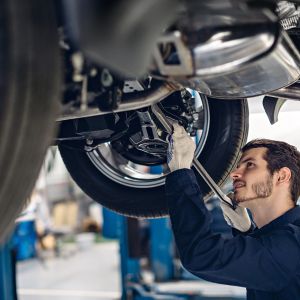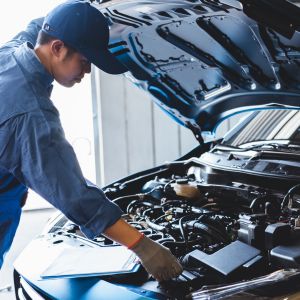Regular car maintenance and service offer numerous benefits that help keep a vehicle running smoothly, safely, and efficiently. Regular maintenance helps prevent unexpected breakdowns by identifying and addressing small issues before they become major problems. It also helps improve fuel efficiency, prolong the life of the vehicle and its components, and maintain its value.
Regular maintenance also helps enhance safety by ensuring that critical systems such as brakes, steering, and suspension are functioning properly. By performing regular car maintenance and services, vehicle owners can have peace of mind knowing that their vehicle is running at its best, avoiding costly repairs, and ensuring a safe and reliable driving experience.
Advantages of regular car maintenance and services

Regular car maintenance and service offer several benefits that help keep a vehicle running smoothly, safely, and efficiently.
1. Improved reliability: Regular car maintenance helps identify and address small issues before they become major problems. This can reduce the likelihood of breakdowns and unexpected repairs, making the vehicle more reliable.
2. Increased fuel efficiency: Keeping the engine tuned, tires properly inflated, and other systems functioning efficiently can improve a car’s fuel efficiency, potentially saving money on fuel costs.
3. Enhanced safety: Regular car maintenance helps maintain key safety features such as brakes, steering, and suspension, ensuring that the vehicle performs as it should in an emergency.
4. Prolonged lifespan: Regular car maintenance helps extend the life of a vehicle by detecting and fixing problems early, maintaining key systems and components in good condition, and ensuring that the car runs smoothly and efficiently.
5. Maintained value: Regular car maintenance helps maintain the value of a vehicle by demonstrating that it has been well-maintained, which can increase its resale value.
In conclusion, regular car maintenance and service are important for ensuring that a vehicle performs at its best, providing peace of mind and helping to prevent costly repairs and replacements.
Common types of car maintenance and services

Car maintenance and services are routine checks and procedures performed to keep a vehicle running smoothly, safely, and efficiently. Here are some common types of car maintenance and services:
Oil changes: Regular oil changes are crucial for maintaining the health of the engine. Oil helps lubricate moving parts, reduce friction, and keep the engine cool. Over time, oil can become dirty and less effective, so it’s important to have it changed regularly.
Tire rotations: Tire rotations help ensure even wear on all four tires, extending their lifespan and improving driving stability. Tires should be rotated every 6,000 to 8,000 miles.
Battery checks: Regular battery checks help ensure that the battery has enough charge to start the engine and power the vehicle’s electronics. It’s a good idea to have the battery checked every 12 to 24 months.
Brake inspections: Brakes are a critical safety feature, so it’s important to have them inspected regularly to ensure they’re functioning properly. Brake inspections should be performed at least once a year, or more frequently if the brakes are making strange noises or the vehicle is pulling to one side while braking.
Fluid replacements: Engine oil, coolant, power steering fluid, transmission fluid, and brake fluid are all essential for a vehicle’s performance and longevity. Regular fluid replacements help ensure that these fluids are clean and at the correct levels, which can prevent damage and extend the life of the vehicle’s components.
Engine tune-ups: Engine tune-ups help maintain the engine’s performance by addressing issues such as dirty air filters, worn spark plugs, and misfiring cylinders. Engine tune-ups should be performed every 30,000 to 50,000 miles, or as recommended by the vehicle manufacturer.
In conclusion, regular car maintenance and services help keep a vehicle running smoothly, safely, and efficiently, by addressing small issues before they become major problems, extending the life of key components, and maintaining the car’s performance.
What are the most important things to check during a car service?

During a car service, a number of checks and procedures are performed to ensure that a vehicle is running smoothly, safely, and efficiently. Here are some of the most important things to check during a car service:
Engine oil: Engine oil is essential for maintaining the health of the engine, so it’s important to check the oil level and quality regularly. The oil should be clean, at the correct level, and free of contaminants.
Tires: Tires should be checked for proper inflation, tread depth, and wear patterns. Uneven tire wear can indicate problems with the suspension, alignment, or tire balance, which can be addressed during a car service.
Brakes: Brakes are a critical safety feature, so it’s important to have them inspected regularly to ensure they’re functioning properly. The brake pads, rotors, and calipers should be checked for wear and damage, and the brake fluid level should be checked.
Battery: The battery should be checked for proper charge and connectivity, and the battery terminals should be cleaned if necessary. A weak battery can cause starting problems and reduce the lifespan of the battery.
Lights: All the lights on the vehicle should be checked to ensure that they’re functioning properly, including the headlights, taillights, turn signals, and hazard lights.
Suspension: The suspension system should be checked for leaks, wear, and damage. The shocks and struts should be checked for leaks and excessive wear, and the steering components should be checked for looseness or play.
Engine performance: The engine should be checked for misfires, rough idling, and other performance issues. The air filter, spark plugs, and other components should be checked for wear and damage.
In conclusion, during a car service, it’s important to check the engine oil, tires, brakes, battery, lights, suspension, and engine performance to ensure that a vehicle is running smoothly, safely, and efficiently. Addressing any issues during a car service can prevent more costly repairs in the future.
Frequently Asked Questions
Q1. What are some common types of car maintenance and services?
Ans: Common types of car maintenance and services include oil changes, tire rotations, battery checks, brake inspections, fluid replacements, and engine tune-ups.
Q2. How can regular car maintenance help to extend the life of my vehicle?
Ans: Regular car maintenance can help extend the life of a vehicle by detecting and fixing problems early, maintaining key systems and components in good condition, and ensuring that the car runs smoothly and efficiently.
Q3. How does regular car maintenance affect the car’s fuel efficiency?
Ans: Regular car maintenance can improve fuel efficiency by keeping the engine tuned, the tires properly inflated, and the transmission and other systems functioning efficiently.
Q4. Can regular car maintenance help prevent costly repairs in the future?
Ans: Yes, regular car maintenance can help prevent costly repairs in the future by detecting and fixing problems early, before they become more serious and expensive to repair.
Q5. What are the most important things to check during a car service?
Ans: The most important things to check during a car service include tire pressure and wear, oil level and condition, brakes, battery, fluids, belts, hoses, and suspension.
Q6. How does regular car maintenance help with the car’s safety and performance?
Ans: Regular car maintenance helps with the car’s safety and performance by ensuring that the car’s key systems and components are functioning properly, detecting and fixing problems early, and maintaining good driving conditions.

